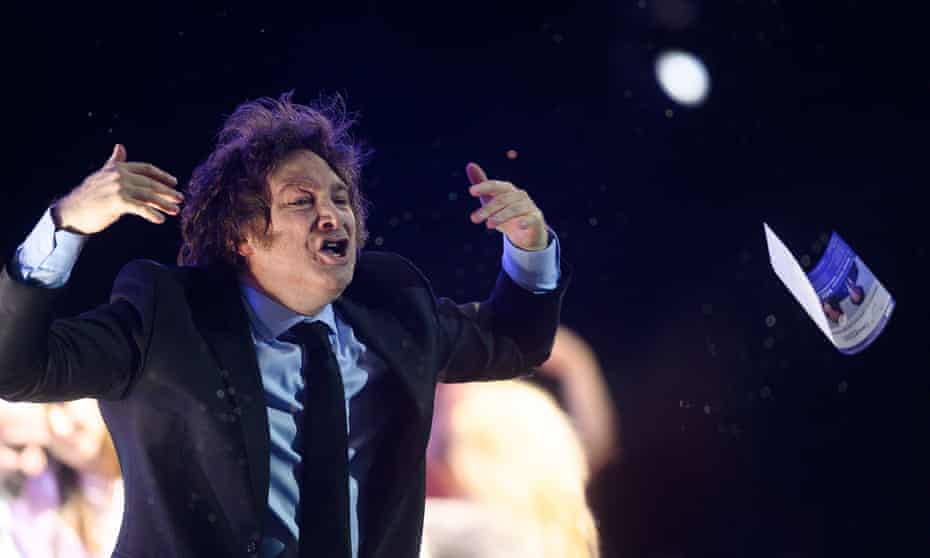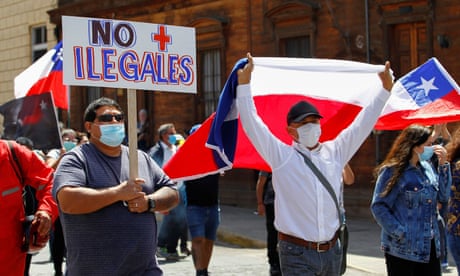Ruling Peronist party lost majority as Javier Milei turned notoriety into votes and a Trotskyist party got third largest vote share

Uki Goñi in Buenos Aires
Mon 15 Nov 2021
Argentina’s political system is braced for an earthquake after parties on the extreme left and right made big gains in weekend midterm congressional elections, putting an end to decades in which the country’s populists and conservatives wrestled for power.
Sunday’s vote saw the Peronist Front for Everyone coalition of President Alberto Fernández lose its majority in Congress for the first time in almost 40 years and lose its stronghold of Buenos Aires province to the center-right coalition Together for Change.
Nationally, the Trotskyist Leftist Worker Front (FIT) won the third largest share of the votes, but it was the sudden rise of the far-right libertarian Liberty Advances party that dominated local coverage of the results.
The party’s wild-haired leader, Javier Milei, has refused to be vaccinated against Covid, denies climate change is real, and describes himself as a “lion”.
Milei rose to fame last year with on-air boasts of his sexual prowess, eventually converting media notoriety into votes and peeling away support from Together for Change, the conservative party of former president Mauricio Macri, who hopes to return to the presidency in 2023.
“Free souls; thank you for your roar,” Milei said after wining 17% of the vote in the capital city of Buenos Aires – previously unheard of for a third party in the nation’s capital. “This is a historic event. Being a liberal is no longer shameful in Argentina.”
As if to confirm the party’s maverick image, a victory celebration on Sunday night was overshadowed by the behaviour of an armed party bodyguard who flashed his weapon at a heckler.
The party’s congressional seat winner, Victoria Villarroel, looked on impassively as the bodyguard stormed on to the stage before her, pulled back his coat and unclipped his holster in what appeared to be a threat, before he was removed by party officials.

Chile far-right candidate rides anti-migrant wave in presidential poll
Villarroel, who campaigns for the release of the jailed torturers and murderers of Argentina’s 1976-83 dictatorship, said: “They’ve taken the bread from our mouths, they’ve stepped on our heads with taxes and regulations. Today is the victory of the common people.”
The party’s success was hailed by far-right groups across the region which have found growing political success with a mixture of climate-skeptic, Covid-denialist, nationalist and militarist messages.
“The triumph of Javier Milei in Argentina is great news for Latin America. Argentina is a great country and for decades it has been ravaged by populism and incompetence. Enough of abuse and corruption!” tweeted José Antonio Kast, the far-right candidate in Sunday’s presidential elections.
The arrival of new far-right and far-left faces in congress is likely to add further uncertainty to a scenario in which President Fernández has lost his quorum in the senate.

Fernández’s Peronist Front for Everyone and the conservative Together for Change coalition ran neck and neck in Argentina’s main electoral district, the province of Buenos Aires with 15 million of Argentina’s 45 million inhabitants, both obtaining 15 seats in the lower house of congress. Another far-right party led by the economist José Luis Espert won three seats and the leftwing FIT two.
FIT meanwhile emerged as the third political force nationwide, with about 6% of the national vote, previously unheard of for a leftist party, gaining congressional seats in a number of provinces.
“There’s been a growth on both the right and on the left,” said Myriam Bregman, elected as a lower house legislator for the city of Buenos Aires. “It’s evident that there is a sector that is starting to see the left as a way out of the economic and social situation, because the left is now the third national political force,” Bregman added.
'Drained of power': Argentina's Peronists face identity crisis
after midterm rout
By Eliana Raszewski and Nicolás Misculin
BUENOS AIRES (Reuters) -Argentina's Peronist ruling coalition is teetering on the brink of political crisis, with President Alberto Fernandez facing a fight for control after voters abandoned his party in bruising midterm elections, sapping his power in Congress.
The party, a mix of center-left moderates allied with the president and a powerful hard-left faction around Vice President Cristina Fernandez de Kirchner, now has a dilemma: concede ground to work with the opposition, swerve left - or split down the middle.
"The government has serious problems. It is a president who is totally drained of power," said Mariel Fornoni from political consultancy Management & Fit. "The coalition is broken."
The Sunday vote https://www.reuters.com/world/americas/argentines-vote-midterm-trial-by-fire-president-fernandez-2021-11-14 saw the Peronists lose their majority in the Senate for the first time since 1983, with a number of provinces swinging sharply away from the government of Fernandez, who swept to power in 2019.
The loss hobbles his government's ability to push through legislation in Congress, hitting plans for judicial reform and adding complexity to talks over a new $45 billion deal with the International Monetary Fund, which needs lawmaker approval.
Alberto Ramos at Goldman Sachs said in a note that the defeat could leave the ruling party weakened and that "internal dissent over policy direction could grow further," potentially impacting moderate voices like Economy Minister Martin Guzman.
"Losing control of Congress implies the government would have to negotiate with a stronger and re-energized opposition that could lead to a noisy and volatile policy-making process," he said.
In a message recorded after the defeat, President Fernandez struck a moderate tone, saying he would call for dialogue with the opposition, redouble efforts to solve the IMF debt, put a economic plan to Congress and take aim at inflation.
However, he played down suggestions of reining in public spending, that many see as vital amid tough economic conditions.
"It is necessary to get the state accounts in order, but never at the cost of an adjustment in spending. The adjustment was tried repeatedly in Argentina and only deepened inequality and poverty," he said.
The IMF said through a spokesman that they "continue to work" on a plan that tackles "Argentina's most pressing economic and social challenges, including high inflation, which disproportionately hurts the most vulnerable."
POLITICAL COST
The government has a long list of crises to solve.
Inflation is running at over 50% annually, poverty is above 40%, and the peso currency trades at some 200 per dollar in informal markets that have blossomed amid capital controls, double the official exchange rate of 100 pesos per dollar.
Some foresee a faster devaluation of the currency to bring the two rates closer together and to match rising prices.
"In December or a bit earlier, the pace of the official devaluation is going to accelerate to prevent the dollar from lagging too far behind inflation," said Roberto Geretto, an economist at Fundcorp.
Talks with the IMF over a new deal have also dragged, amid divisions within the government. Many Argentines blame the lender for worsening previous economic crises.
Julio Burdman, a political analyst from the Electoral Observatory, said, however, that the opposition would likely get on board with the deal.
"I think the agreement with the IMF does not depend on politics," he said. "There is no one interested in Argentina not signing an agreement."
(Reporting by Nicolás Misculin and Eliana Raszewski in Buenos Aires; Additional reporting by Rodrigo Campos in New York; Editing by Adam Jourdan, Robert Birsel and Rosalba O'Brien)
No comments:
Post a Comment